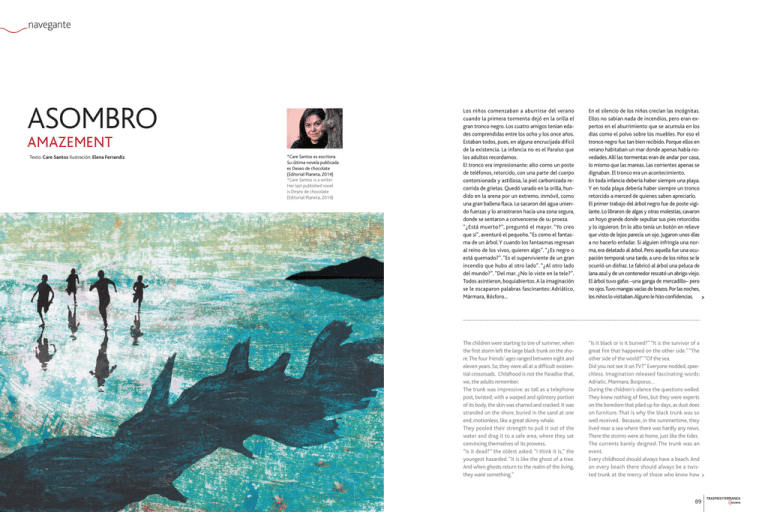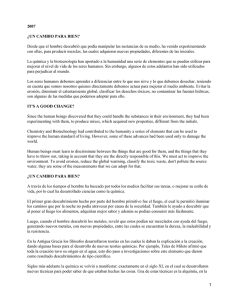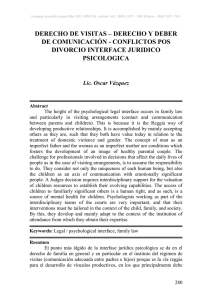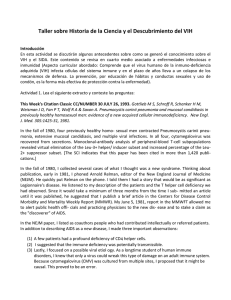asombro - Trasmediterranea
Anuncio

navegante ASOMBRO AMAZEMENT Texto: Care Santos Ilustración: Elena Ferrandiz 88 *Care Santos es escritora. Su última novela publicada es Deseo de chocolate (Editorial Planeta, 2014) *Care Santos is a writer. Her last published novel is Deseo de chocolate (Editorial Planeta, 2014) Los niños comenzaban a aburrirse del verano cuando la primera tormenta dejó en la orilla el gran tronco negro. Los cuatro amigos tenían edades comprendidas entre los ocho y los once años. Estaban todos, pues, en alguna encrucijada difícil de la existencia. La infancia no es el Paraíso que los adultos recordamos. El tronco era impresionante: alto como un poste de teléfonos, retorcido, con una parte del cuerpo contorsionada y astillosa, la piel carbonizada recorrida de grietas. Quedó varado en la orilla, hundido en la arena por un extremo, inmóvil, como una gran ballena flaca. Lo sacaron del agua uniendo fuerzas y lo arrastraron hacia una zona segura, donde se sentaron a convencerse de su proeza. “¿Está muerto?”, preguntó el mayor. “Yo creo que sí”, aventuró el pequeño. “Es como el fantasma de un árbol. Y cuando los fantasmas regresan al reino de los vivos, quieren algo”. “¿Es negro o está quemado?”. “Es el superviviente de un gran incendio que hubo al otro lado”. “¿Al otro lado del mundo?”. “Del mar. ¿No lo viste en la tele?”. Todos asintieron, boquiabiertos. A la imaginación se le escaparon palabras fascinantes: Adriático, Mármara, Bósforo... En el silencio de los niños crecían las incógnitas. Ellos no sabían nada de incendios, pero eran expertos en el aburrimiento que se acumula en los días como el polvo sobre los muebles. Por eso el tronco negro fue tan bien recibido. Porque ellos en verano habitaban un mar donde apenas había novedades. Allí las tormentas eran de andar por casa, lo mismo que las mareas. Las corrientes apenas se dignaban. El tronco era un acontecimiento. En toda infancia debería haber siempre una playa. Y en toda playa debería haber siempre un tronco retorcido a merced de quienes saben apreciarlo. El primer trabajo del árbol negro fue de poste vigilante. Lo libraron de algas y otras molestias, cavaron un hoyo grande donde sepultar sus pies retorcidos y lo irguieron. En lo alto tenía un botón en relieve que visto de lejos parecía un ojo. Jugaron unos días a no hacerlo enfadar. Si alguien infringía una norma, era delatado al árbol. Pero aquella fue una ocupación temporal: una tarde, a uno de los niños se le ocurrió un disfraz. Le fabricó al árbol una peluca de lana azul y de un contenedor rescató un abrigo viejo. El árbol tuvo gafas –una ganga de mercadillo– pero no ojos. Tuvo mangas vacías de brazos. Por las noches, los niños lo visitaban. Alguno le hizo confidencias. The children were starting to tire of summer, when the first storm left the large black trunk on the shore. The four friends’ ages ranged between eight and eleven years. So, they were all at a difficult existential crossroads. Childhood is not the Paradise that, we, the adults remember. The trunk was impressive: as tall as a telephone post, twisted, with a warped and splintery portion of its body, the skin was charred and cracked. It was stranded on the shore, buried in the sand at one end, motionless, like a great skinny whale. They pooled their strength to pull it out of the water and drag it to a safe area, where they sat convincing themselves of its prowess. “Is it dead?” the oldest asked. “I think it is,” the youngest hazarded. “It is like the ghost of a tree. And when ghosts return to the realm of the living, they want something.” “Is it black or is it burned?” “It is the survivor of a great fire that happened on the other side.” “The other side of the world?” “Of the sea. Did you not see it on TV?” Everyone nodded, speechless. Imagination released fascinating words: Adriatic, Marmara, Bosporus… During the children’s silence the questions welled. They knew nothing of fires, but they were experts on the boredom that piled up for days, as dust does on furniture. That is why the black trunk was so well received. Because, in the summertime, they lived near a sea where there was hardly any news. There the storms were at home, just like the tides. The currents barely deigned. The trunk was an event. Every childhood should always have a beach. And on every beach there should always be a twisted trunk at the mercy of those who know how 89 navegante Hasta que un día los niños llegaron a la playa y el árbol no estaba donde siempre. Lo buscaron hasta encontrarlo en la caravana de un turista inglés muy viejo. Estaba junto al toldo del porche y servía para sostener jaulas de pájaros, más de doce. Mantenía la peluca azul, que la brisa marina despeinaba a su capricho. “Es nuestro”, protestaron los niños, “ese inglés no tiene derecho”. “Los amigos no pertenecen a nadie. Vuelven si quieren”. “¿Y creéis que nuestro árbol volverá?”. Llegó el final de las vacaciones y el árbol seguía so- portando pajaritos. Los niños miraban mal al inglés, pero él no era consciente de su falta. Durante aquel invierno, los niños suspiraron de alivio al pensar que el inglés debió de quedarse allí, en su playa, hasta bien entrado el curso. Al cabo, los niños son personas muy ocupadas, de las que sólo en verano tienen tiempo de cuidar árboles muertos. Al verano siguiente, los cuatro regresaron a la playa de su memoria. El árbol ya no estaba. El inglés, tampoco. Los niños crecieron. Ahora son adultos que miran al mar con asombro, siempre esperando algo que llegará. ■ to appreciate it. The black tree’s first job was as a guard post. They cleaned it of algae and other encumbrances; they dug a great hole where they buried its twisted legs and stood it upright. At its top end, it had a protruding button that looked like an eye. For a few days, they played trying to avoid its anger. If anyone violated a rule, the tree was informed. But that was a temporary job. One afternoon, one of the children thought up a disguise. He made a blue wool wig for the tree and from a container he rescued an old coat. The tree had glasses –a flea market trinket– but not eyes. It had sleeves without arms. At night, the children would visit it. Someone would confide in it. Until, one day, the children arrived at the beach and the tree was not where it had always been. They looked for it until they found it near an elderly English tourist’s camping trailer. It stood by the porch awning and it had become a support for bird cages, more than twelve of them. It still had the blue wig that the seaside breeze dishevelled at will. “It’s ours,” argued the children, “the Englishman has no right to it”. “Friends do not belong to anyone. They return if they wish.” “And do you think our tree will come back?” When the holidays ended, the tree was still a support for birds. The children glared at the Englishman, but he was not aware of his offence. During that winter, the children sighed in relief thinking that the Englishman must have stayed there, on their beach, well into the school year. After all, children are busy people; only in the summertime do they have time to care for dead trees. The following summer, the four returned to the beach of their memories. The tree was no longer there. Neither was the Englishman. The children grew up. Now they are adults that look at the sea in amazement, always waiting for something that will come.. ■ 90


